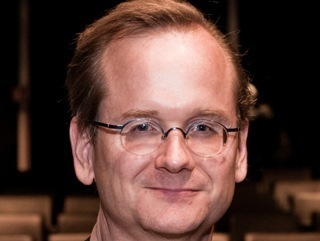Lawrence Lessig on the Google Book Search Settlement – “Settlements: Static goods, dynamic bads”
August 3rd, 2009
Larry Lessig, Professor of Law and founder of the Stanford Center for Internet and Society speaks at the Berkman Center workshop “Alternative Approaches to Open Digital Libraries in the Shadow of the Google Book Search Settlement” held July 31, 2009.
Sponsored by the Berkman Center for Internet & Society, the Harvard Law School Library, and Professors Charles Nesson, John Palfrey and Phil Malone.
Click Above for Video
…or download the OGG video format!
Entry Filed under: video
8 Comments Add your own
Leave a Comment
Some HTML allowed:
<a href="" title=""> <abbr title=""> <acronym title=""> <b> <blockquote cite=""> <cite> <code> <del datetime=""> <em> <i> <q cite=""> <s> <strike> <strong>





1. Jeffrey A. Williams | August 5th, 2009 at 12:30 am
Larry,
sorry I was not able to listen to your vedio as it is in a propriatary format. Perhaps you could be so kind as to have it avaliable in a non-propriatary format in the very near future?
Other than this, the Google book settelment is yet to be fully setteled as you likely know of should know. None the less the effacacy of same has met with great and considered skeptisim and critisizm as well and as such, remains a black stain on Google and it’s business practices to date. This is unfortunate but of course not not unjustified or earned. Let’s hope that the several recomendations submitted to the court and Google will be also implimented and overseen appropriately in an unbiased manner soon.
2. Nathan Naze | August 5th, 2009 at 1:53 pm
Thank you for posting this. I am glad that it was made available. It would be nice to also post on the YouTube Berkman Center channel, though you may be planning on doing so already. Many thanks.
3. djones | August 6th, 2009 at 1:14 pm
Hi Jeffrey!
Actually the video is available in the Ogg format – click back to the post and you’ll see a link to download it below the video. We’ll also be making an edit to the video to better incorporate Professor Lessig’s wonderful slide presentation. Look for that later this weekend.
Thanks for watching!
4. djones | August 6th, 2009 at 1:15 pm
Hi Nathan,
We’ll be incorporating Professor Lessig’s brilliant slides into the presentation later this weekend. After that we’ll definitely post it up on YouTube!
Thanks for watching!
5. ResourceShelf » Blo&hellip | August 8th, 2009 at 2:57 pm
[…] Download or Watch Video OR Listen to Audio […]
6. TECHNOLOGY : Lawrence Les&hellip | August 9th, 2009 at 7:12 am
[…] TECHNOLOGY : Lawrence Lessig on the Google Book Search Settlement – “Settlements: Static goods, dynamic bads” MediaBerkman : Lawrence Lessig on the Google Book Search Settlement – “Settlements: Static g…. […]
7. Doc Searls Weblog ·&hellip | August 12th, 2009 at 11:44 am
[…] Lessig says this settlement moves books down the path of documentary films: access encumbered by a bunch of agreements, without a guarantee of future access. It is “worse that a digital bookstore.” It brings us to “an excessive permission culture” produced by “a structure of oligopolies”. A “tendency to access” but not of free access. He suggests that we are turning our culture over to tigers when they still look like kittens. […]
8. Pranker Shutter | July 28th, 2010 at 6:58 am
Let’s see, Google wanted to make books easier to find. So, a bunch of people in the book business sued for damages. (That’s the publishing business for you!) Now they come up with a settlement where books will sell over Google much as any bookstore — even books that are still in copyright but not available in print. Heavens, says Law Professor P. Samuelson, the law cannot permit this without an Act of Congress which by their last several Acts have created a vast number of books which are illegal to reprint, even though the books are no longer available for sale, so there’s no actual interest to protect by copyright, except the interest in limiting the amount of information available to readers. We need to protect the right of George Orwell’s grandchildren to keep his works off of the Kindle, at least unless they can cash in. So what if the Constitution defines a purpose for copyright, and it isn’t money-grubbing by the author’s descendants, who would deprive the world of their ancestor’s works if they can’t cash in on it? But let’s go back to Congress and see what they come up with this time, that might encourage some more donations from Hollywood in return for extending the length of copyright another hundred years or so? The implicit premise of Prof. Samuelson’s view is that our current copyright law is constitutional and that the courts cannot entertain any settlement that would — heavens! — make books more widely and easily available to the public.